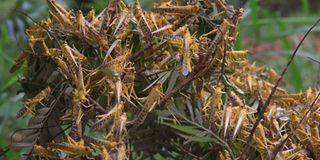State reveals plan to combat locusts in Taita-Taveta

A swarm of desert locusts on a macadamia tree at Kangurwe village in Nyeri county on February 19, 2020.
What you need to know:
- On Sunday, a team from the Locust Control Centre surveyed the affected areas.
- Agriculture CS Peter Munya assures residents that the government is prepared to contain the pests.
Panic has gripped farmers in Taita-Taveta County after swarms of locusts were spotted in Taveta sub-county, which is the county's breadbasket.
However, the government has assured the farmers that it has initiated plans to counter the locusts before they destroy crops and vegetation in the area.
Col (Rtd) Julius Ngera from the National Locust Control Centre asked the farmers to be calm as the government combats the pests.
Mr Ngera said spraying would start Monday morning in Voi, Ngolia, Manoa and Eldoro areas.
The locusts are currently at the copulating stage and not destructive to vegetation and crops.
A team from the ministry, led by Mr Ngera, has been on the ground to survey the extent of destruction and the areas to be sprayed.
"We want to kill the locusts before they start laying eggs. As you can see, they are mating so very soon the females will lay eggs and, once they are hatched, millions of locusts will be released and they will be very destructive," he explained.
He said the third wave of swarms, which entered the county on Friday, are splinter groups that could have originated from Makueni, Kitui or the vast Tsavo East National Park.
However, he said the government was putting in place control measures that will involve officers from the Ministry of Agriculture, the county government, Kenya Wildlife Service, police, National Government Administration Officers ( Ngao) and the local community to coordinate efforts of controlling the pests.
"The truth is that we cannot completely eradicate the locusts. What we can do is to control them by spraying them. Spraying does not kill the eggs; that is where the problem lies," he said.
County executive for Agriculture Davis Mwangoma said the situation is under control as the government has already deployed three aircraft to spray chemicals in affected areas.
Mr Mwangoma also said the government would train more than 30 scouts across the county to boost ground control capacity by tracking and also hand spraying the insects.
The CEC said the county government has petitioned the national government to include the devolved unit in the locust control programme.
"We need to manage them early before more eggs are hatched. We are worried that if we fail to do something now then in the next 21 days, we might have a bigger problem than what we are seeing now," he said.
According to Mr Mwangoma, the government is working to ensure that the mature locusts are destroyed before they lay eggs.
"The locusts could destroy the country’s food supply at a time of food insecurity in the region," he said.
On Sunday, a team from the Locust Control Centre surveyed the affected areas in Ikanga, Mbololo, Ngolia and Kimorigo areas in Taveta sub-county.
The farmers called on the government to control the locusts before they destroy crops.
"We fear that we will incur losses and face hunger if the government fails to control the situation," said Mr James Mwangemi, a farmer in Ikanga.
The government had announced that it will deploy spray aircraft to fight armies of locusts in parts of Taita-Taveta, Wajir and Mandera counties, two months after the Ministry of Agriculture declared Kenya locust free.
Agriculture Cabinet Secretary Peter Munya announced on Saturday that the swarms that are currently ravaging the three counties are mature but warned that they might have laid eggs, which are expected to hatch soon.
The CS said the government is prepared to contain the locusts to prevent them from destroying farms and threatening food security in the country.
Some Sh3.2 billion has been set aside to combat the insects.
Mr Munya said the government has deployed the National Youth Service to help in fighting the insects in the affected counties.





